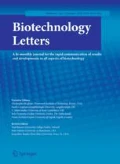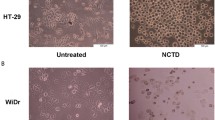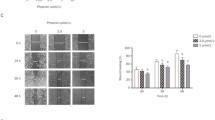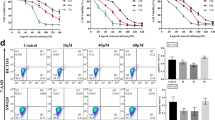Abstract
Cancer metastasis is the primary cause of death in patients diagnosed with colorectal cancer. Piperine, an active nontoxic ingredient in pepper, has potent anti-inflammatory and anti-cancer properties. However, little is known about the anti-migratory and anti-invasive effects of piperine on colorectal cancer. We demonstrated piperine inhibited the migration and invasion of colorectal cancer cells. Then, we found piperine reversed the biomarker expression of epithelial-to-mesenchymal transition (EMT), and suppressed the EMT regulator Snail. Furthermore, signal transducers and activators of transcription 3 (STAT3) was downregulated by piperine. Finally, STAT3 inhibitors were applied to observe the role of STAT3 in colorectal cancer migration, invasion and EMT. Collectively, piperine inhibits colorectal cancer migratory and invasive capacities through STAT3/Snail mediated EMT. Therefore, piperine could be applied as a possible therapeutic regimen for the prevention of colorectal cancer metastasis.




Similar content being viewed by others
References
Beach S, Tang H, Park S, Dhillon AS, Keller ET, Kolch W, Yeung KC (2008) Snail is a repressor of RKIP transcription in metastatic prostate cancer cells. Oncogene 27:2243–2248. https://doi.org/10.1038/sj.onc.1210860
Do MT et al (2013) Antitumor efficacy of piperine in the treatment of human HER2-overexpressing breast cancer cells. Food Chem 141:2591–2599. https://doi.org/10.1016/j.foodchem.2013.04.125
Greenshields AL et al (2015) Piperine inhibits the growth and motility of triple-negative breast cancer cells. Cancer Lett 357:129–140. https://doi.org/10.1016/j.canlet.2014.11.017
Huang C, Yang G, Jiang T, Zhu G, Li H, Qiu Z (2011) The effects and mechanisms of blockage of STAT3 signaling pathway on IL-6 inducing EMT in human pancreatic cancer cells in vitro. Neoplasma 58:396–405. https://doi.org/10.4149/neo_2011_05_396
Jiang R et al (2011) Interleukin-22 promotes human hepatocellular carcinoma by activation of STAT3. Hepatology 54:900–909. https://doi.org/10.1002/hep.24486
Kong G et al (2017) Irisin reverses the IL-6 induced epithelial–mesenchymal transition in osteosarcoma cell migration and invasion through the STAT3/Snail signaling pathway. Oncol Rep 38:2647–2656. https://doi.org/10.3892/or.2017.5973
Liao X et al (2018) LAMP3 regulates hepatic lipid metabolism through activating PI3K/Akt pathway. Mol Cell Endocrinol 470:160–167. https://doi.org/10.1016/j.mce.2017.10.010
Liu WH et al (2015) Cisplatin-selected resistance is associated with increased motility and stem-like properties via activation of STAT3/Snail axis in atypical teratoid/rhabdoid tumor cells. Oncotarget 6:1750–1768. https://doi.org/10.18632/oncotarget.2737
Pradeep CR, Kuttan G (2002) Effect of piperine on the inhibition of lung metastasis induced B16F–10 melanoma cells in mice. Clin Exp Metastasis 19:703–708. https://doi.org/10.1023/a:1021398601388
Rokavec M et al (2014) IL-6R/STAT3/miR-34a feedback loop promotes EMT-mediated colorectal cancer invasion and metastasis. J Clin Investig 124:1853–1867. https://doi.org/10.1172/JCI73531
Siegel RL, Miller KD, Jemal A (2018) Cancer statistics, 2018. CA: Cancer J Clin 68:7–30. https://doi.org/10.3322/caac.21442
Wang H et al (2013) Epithelial–mesenchymal transition (EMT) induced by TNF-α requires AKT/GSK-3β-mediated stabilization of snail in colorectal cancer. PLoS ONE 8:e56664. https://doi.org/10.1371/journal.pone.0056664
Wu TJ et al (2016) Severe hepatitis promotes hepatocellular carcinoma recurrence via NF-kappaB pathway-mediated epithelial–mesenchymal transition after resection. Clin Cancer Res 22:1800–1812. https://doi.org/10.1158/1078-0432.ccr-15-0780
Xia Y et al (2015) Piperine inhibits IL-1beta-induced IL-6 expression by suppressing p38 MAPK and STAT3 activation in gastric cancer cells. Mol Cell Biochem 398:147–156. https://doi.org/10.1007/s11010-014-2214-0
Yaffe PB, Power Coombs MR, Doucette CD, Walsh M, Hoskin DW (2015) Piperine, an alkaloid from black pepper, inhibits growth of human colon cancer cells via G1 arrest and apoptosis triggered by endoplasmic reticulum stress. Mol Carcinog 54:1070–1085. https://doi.org/10.1002/mc.22176
Ying X, Chen X, Cheng S, Shen Y, Peng L, Xu HZ (2013) Piperine inhibits IL-beta induced expression of inflammatory mediators in human osteoarthritis chondrocyte. Int Immunopharmacol 17:293–299. https://doi.org/10.1016/j.intimp.2013.06.025
Zhang J et al (2015) Piperine inhibits proliferation of human osteosarcoma cells via G2/M phase arrest and metastasis by suppressing MMP-2/-9 expression. Int Immunopharmacol 24:50–58. https://doi.org/10.1016/j.intimp.2014.11.012
Zhou ZJ et al (2014) HNRNPAB induces epithelial–mesenchymal transition and promotes metastasis of hepatocellular carcinoma by transcriptionally activating SNAIL. Cancer Res 74:2750–2762. https://doi.org/10.1158/0008-5472.can-13-2509
Supporting information
Supplementary Table 1—Primers used for qPCR analysis.
Supplementary Figure 1—Stattic inhibits EMT, migration and invasion of colorectal cancer cells. p-STAT3, STAT3, Snail, E-cadherin and vimentin protein expression were measured by western blot assay after stattic (0.5 μM and 1.0 μM) treatment for 48 h (A). The migration and invasion capacities of the cells were observed after stattic treatment for 48 h (B), and statistics were presented in C; stattic, a specific inhibitor of STAT3; the bars in figures represent the mean ± SD; *p < 0.05, **p < 0.01.
Funding
This work was supported by Guizhou Province Natural Science Foundation (No.[2020]1Y341) and Guizhou Provincial Key Laboratory of Pathogenesis & Drug Research on Common Chronic Diseases, Guizhou Medical University.
Author information
Authors and Affiliations
Corresponding author
Ethics declarations
Conflict of interest
The author declares that they have no conflicts of interest.
Ethical approval
This article does not contain any studies with human participants or animals performed by any of the authors.
Additional information
Publisher's Note
Springer Nature remains neutral with regard to jurisdictional claims in published maps and institutional affiliations.
Electronic supplementary material
Below is the link to the electronic supplementary material.
Rights and permissions
About this article
Cite this article
Song, L., Wang, Y., Zhen, Y. et al. Piperine inhibits colorectal cancer migration and invasion by regulating STAT3/Snail-mediated epithelial–mesenchymal transition. Biotechnol Lett 42, 2049–2058 (2020). https://doi.org/10.1007/s10529-020-02923-z
Received:
Accepted:
Published:
Issue Date:
DOI: https://doi.org/10.1007/s10529-020-02923-z




